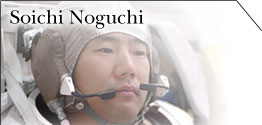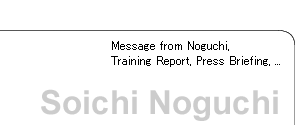Astronaut Noguchi's Training Report, #2
Utilizing the crew members' abilities to the maximum extent
Last Updated: May 15, 2002
In space flight, it is most important for the crew members to cooperate with each other by utilizing each person's ability to the maximum extent so that the team can have the highest performance. However excellent a pilot or a scientist an astronaut might be, he or she cannot go to space alone. It is often mentioned in the world of sports that teamwork is important; an astronauts' world is no different. Astronauts' teamwork in training is the theme of this month's report.
Crew Resource Management to increase teamwork performance
Astronauts' teamwork is not a vague idea like "cooperation in a friendly manner." Based on a clear responsibility assignment and work volume for each member, backup assignment will be defined to cover each members' mistakes. This will lead the team to produce maximum results by fully utilizing each member's ability and resources. Such teamwork is required for astronauts. To realize such teamwork, NASA applies a method called Crew Resource Management (CRM) for Space Shuttle crew training.
Roles of Captain and Crew Members
When you consider applying CRM, clarifying each member's roles is very important. A captain, the leader of a team, assigns tasks for each crew member so that they can fully utilize their experience and skills. Crew members accept given tasks and responsibilities and perform their own tasks to contribute to the success of the team. Throughout the mission, a crew member tries to accomplish his or her tasks and also those of others. To avoid mistakes and to remember to conduct task items, we try to maintain adequate communications among us. The roles of a captain and roles of crew members are sometimes referred to as leadership and followership.
Crew Meeting
We now meet almost every week to increase our team work; we call this "crew meeting". With our captain's initiative, we discuss all four members' roles for each task. For instance, since James Kelly, the pilot, acquired experience transferring supply items into the International Space Station (ISS) during his previous flight, he will perform supply item management. Stephen Robinson, mission specialist, will support the pilot and the commander as a flight engineer. I will take the primary role of extravehicular activities (EVAs) that will be conducted twice during the mission. I will coordinate the EVAs as the team representative. Thus, our team work will be improved through the crew meeting and by feedback from the training.
Flight Preparations
In February, four of us started team training. Training with the same members is very effective and comfortable. The basic training we have been attending was conducted with different members each time. Learning each member's behavior is not easy, so it is difficult to comprehend how the team should conduct training. In contrast, if you continue experiencing various simulations with the same members, gradually you will be able to see what your colleagues are doing and what you should do. You will begin to think how the team members should think and what shortcuts could improve the team skills. Essentially, it is all for one and one for all. We four members are continuing training in a warm and comfortable mood, which makes me feel confident that the team members' efforts will lead to mission success.
LF1 Crew members
LF1 will be our captain Eileen Collins' fourth flight. She flew as a pilot for her first two missions and became the first female captain on her third flight when she flew the Space Shuttle on mission STS-93. She never forces others to follow her way of doing things. Instead, she offers her opinion first and skillfully derives crew members' ideas, showing respect for them. She exhibits her leadership as a captain and leads her colleagues to seek the success of the whole mission.
Pilot Jim Kelly will be flying on his second space flight. Jim and I were classmates as Astronaut Candidates. We have been good friends since then and know each other very well. Since his previous mission (STS-102) resembles our flight, he advises us how to be more effective based on his experience.
Mission specialist Stephen Robinson will be making his third flight. He was a backup member for the expedition four crew, so he has the latest ISS information. He also flew on STS-95 with Japanese astronaut Chiaki Mukai. He has a good understanding of Japan.
That is so far this month's report. This month's report is somewhat abstract. Next month's report will be more practical and will describe how the training is being conducted.。





